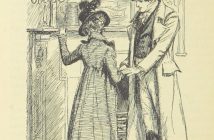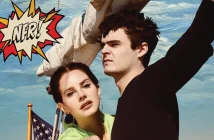Sir Alfred Hitchcock was one of the most famed directors and producers of the 20th Century; and his lasting influence on the film industry to this day cannot be overstated. Pioneer of the psychological thriller, master editor and narrative genius he had a flair for eliciting emotion from an audience unrivalled by any other. His works revered to this day, the 116th anniversary of his birth, The Edge got together to ponder what has made the so-called Master of Suspense’s works so distinctive, well-loved and enduring.
Rebecca (1940)
Rebecca is, in my opinion, one of Mr. Hitchcock’s greatest and most underrated films. Rebecca was very loosely adapted from Daphne du Maurier gothic crime novel of the same name in 1940 starring Sir Laurence Olivier as Max and Joan Fontaine as the heroine Mrs. DeWinter. The film tells the chilling story of the newly wed bride Mrs DeWinter whom is tormented by the memory of her husband’s manipulative dead first wife, Rebecca.
The film is very cleverly constructed not just by his complex and plot-twisting plot which takes the audience on a series of twists and turns and ends with an unexpected outcome, but also by its beautifully constructed cinematography which is present from the very first opening sequence of the haunting abandoned Manderley estate.
It is no surprise that the film was nominated for 11 Academy Awards, winning two include Best Picture, but it has been over shadowed and forget about due by Hitchcock’s game-changing Psycho.
Words by Georgia Simpson
The Birds (1963)
Arguably one of the Master of Suspense’s most uncomfortable efforts, The Birds represents Hitchcock horror at its finest. It may not boast a particularly complex plot – birds attack people and, well, that’s kind of it – but Hitchcock never really needs one to be effective. Here, he’s all about the tension, which is built to such a considerable degree that when the flying horrors do finally lay waste upon the American public (in particularly brutal fashion), it’s not only disturbing visually, but mentally too. Just as Spielberg made it difficult to get back in the water after Jaws, 10 years earlier, Hitchcock made it nearly impossible to even look a passing pigeon in the eye.
Words by Ben Robins
Rear Window (1954)
 Few directors master the thriller genre as well as Hitchcock, and few films keep you as hooked as Rear Window does. Not only does it have the trademark suspense that Hitchcock is so well known for, but it has a really good story to it, played out splendidly by James Stewart and Grace Kelly. Focusing on a murder within Stewart’s apartment complex, Rear Window plays on many humans fears, but none more so than the fear that you have when you question yourself, despite being so sure of something. Couple that with the idea that you just do not know what your neighbours are up to, and the viewer soon finds themselves in the same position as Stewart, questioning everything around them. Cinematically beautiful, this psychological thriller is right up there among Hitchcock’s best works, and is a joy to watch, even if it leaves you feeling rather unsettled after. But hey, isn’t that half the fun of Hitchcock?
Few directors master the thriller genre as well as Hitchcock, and few films keep you as hooked as Rear Window does. Not only does it have the trademark suspense that Hitchcock is so well known for, but it has a really good story to it, played out splendidly by James Stewart and Grace Kelly. Focusing on a murder within Stewart’s apartment complex, Rear Window plays on many humans fears, but none more so than the fear that you have when you question yourself, despite being so sure of something. Couple that with the idea that you just do not know what your neighbours are up to, and the viewer soon finds themselves in the same position as Stewart, questioning everything around them. Cinematically beautiful, this psychological thriller is right up there among Hitchcock’s best works, and is a joy to watch, even if it leaves you feeling rather unsettled after. But hey, isn’t that half the fun of Hitchcock?
Words by Dan Linstead
Vertigo (1958)
Considering that Vertigo is now widely regarded as one of the greatest American films in history amongst critics and audiences alike – it topped the most recent Sight & Sound poll and came second in a similar Total Film list – it’s astonishing just how deeply intimate, unsettling and confrontational it is. Hitchcock loved to play with audience identification, but this – along with Psycho – remains his riskiest experiment. Initially encouraging us to invest whole-heartedly in the journey of the seemingly good-natured retired detective Scottie, the auteur then increasingly reveals that the very qualities we were first drawn to – his introversion, his romanticism, his ambition, his dreaminess, his sensitivity – are essentially rooted in narcissism. He agrees to trail his friend’s wife, Madeleine, as a favor, but quickly develops a voyeuristic fascination with her, which though at first romantic, gradually transforms into a dangerously intense obsession.
This all-encompassing devotion, which leads him to cut off emotional ties with everybody else, is explicitly portrayed as a retreat into solipsism, because he never allows himself get close enough to Madeleine to have feelings for her as an actual individual. Instead, he prefers to revel in the subjectively determined mental image that he has projected onto her. After a while, even the act of looking at her begins to resemble an act of violence, as he tries to re-live the past by attempting to mold her into his idealized memory of another, without ever noticing how this denies her own subjectivity.
Words by James Slaymaker
Psycho (1960)
In 1960, the legendary Hitchcock released Psycho, a film which has now earned the reputation of being one of the best psychological horror films of all time. The film focuses on Marion Crane, a receptionist who finds herself at the secluded and ominous hotel run by Norman Bates. The film ultimately received overwhelming critical acclaim, earning it four Academy Award nominations, including best director for Hitchcock. The film was a game changer in the way that it was seen as the earliest example of the slasher film genre. It changed ideas of sexuality and violence in American cinema, and although it received mixed reviews from critics, it was an unbelievable success with the public.
Hitchcock, who became known as “The Master of Suspense” had a hugely successful career which lasted half a century, directing over 50 films. His trademark directing style made his films very recognisable, and often included a twist as well as a thrilling plot. In 2007 he came first in a poll of film critics in the Daily Telegraph which concluded that he was “unquestionably the greatest filmmaker to emerge from these islands”. Alfred Hitchcock was incredibly influential on both British and American cinema, and was instrumental in the progression the horror genre as we know it today.
Words by Hollie Geraghty




